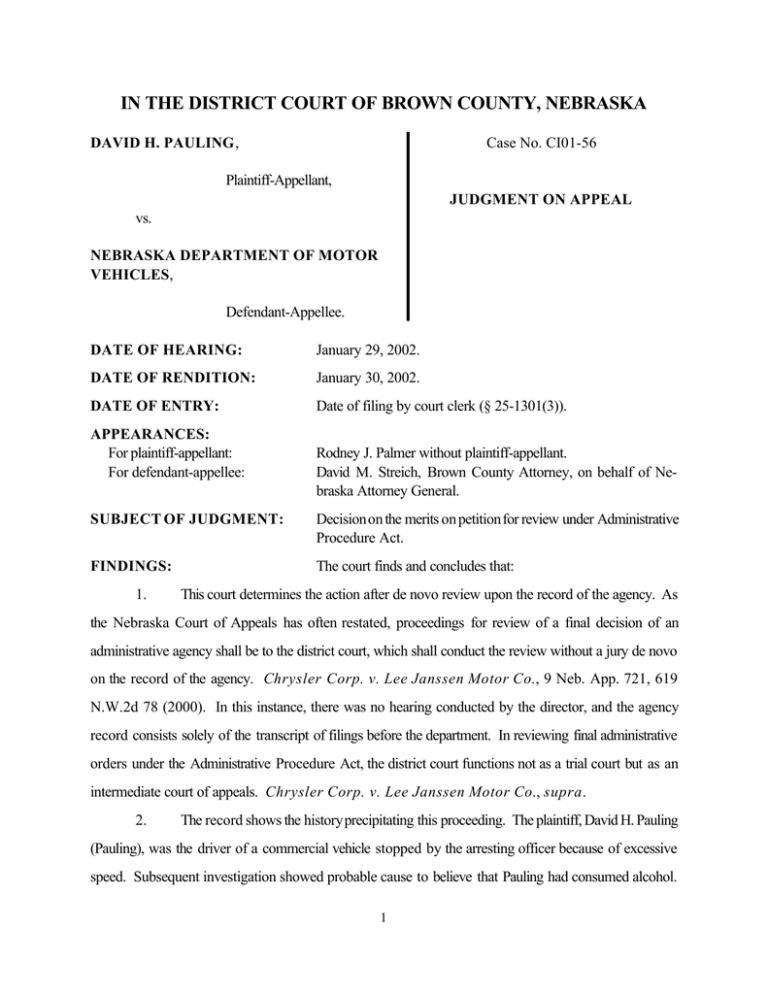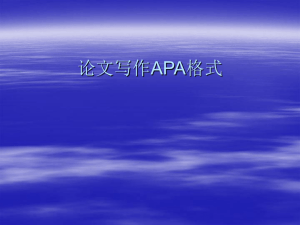IN THE DISTRICT COURT OF BROWN COUNTY, NEBRASKA
advertisement

IN THE DISTRICT COURT OF BROWN COUNTY, NEBRASKA DAVID H. PAULING, Case No. CI01-56 Plaintiff-Appellant, JUDGMENT ON APPEAL vs. NEBRASKA DEPARTMENT OF MOTOR VEHICLES, Defendant-Appellee. DATE OF HEARING: January 29, 2002. DATE OF RENDITION: January 30, 2002. DATE OF ENTRY: Date of filing by court clerk (§ 25-1301(3)). APPEARANCES: For plaintiff-appellant: For defendant-appellee: Rodney J. Palmer without plaintiff-appellant. David M. Streich, Brown County Attorney, on behalf of Nebraska Attorney General. SUBJECT OF JUDGMENT: Decision on the merits on petition for review under Administrative Procedure Act. FINDINGS: The court finds and concludes that: 1. This court determines the action after de novo review upon the record of the agency. As the Nebraska Court of Appeals has often restated, proceedings for review of a final decision of an administrative agency shall be to the district court, which shall conduct the review without a jury de novo on the record of the agency. Chrysler Corp. v. Lee Janssen Motor Co., 9 Neb. App. 721, 619 N.W.2d 78 (2000). In this instance, there was no hearing conducted by the director, and the agency record consists solely of the transcript of filings before the department. In reviewing final administrative orders under the Administrative Procedure Act, the district court functions not as a trial court but as an intermediate court of appeals. Chrysler Corp. v. Lee Janssen Motor Co., supra. 2. The record shows the history precipitating this proceeding. The plaintiff, David H. Pauling (Pauling), was the driver of a commercial vehicle stopped by the arresting officer because of excessive speed. Subsequent investigation showed probable cause to believe that Pauling had consumed alcohol. 1 The officer arrested Pauling for an alcohol-related driving offense and required him to submit to a chemical test. Pauling submitted to a breath test which revealed a concentration of 0.149 grams by weight of alcohol per 210 liters of breath. The arresting officer submitted a sworn report to the director under § 60-4,164(5) regarding commercial driving privilege disqualification. The director issued a notice of disqualification pursuant to § 60-4,167. Pauling requested a hearing. After a hearing, the director made findings determining that Pauling failed to show that he was not operating a commercial vehicle with an alcohol concentration in excess of 0.040 grams by weight of alcohol per 210 liters of breath, and ordered that Pauling’s current Nebraska commercialdriver’s operating privileges be administratively disqualified for one year. The director’s order was rendered and served on April 23, 2001. 3. Pauling timely appealed to this court. After consideration of the matter de novo on the record of the agency, this court affirmed the director’s order by judgment on appeal entered on August 3, 2001. Pauling v. Nebraska Dep’t of Motor Vehicle, 2001-051 (Neb. Dist. Ct., 8th Dist., 2001). No further appeal was taken. 4. On September 17, 2001, Pauling’s counsel faxed to the department a letter requesting reinstatement of Pauling’s license with an attached copy of a county court judgment of acquittal pursuant to jury verdict of not guilty on the charge of driving while under the influence of alcohol. On September 18, Pauling’s counsel faxed to the department a copy of the criminal complaint upon which verdict had been returned and judgment entered. These documents show that trial was held on September 7, 2001, and judgment entered on September 17, 2001. 5. On September 19, 2001, the director rendered an order vacating revocation of operator’s license and reinstating Pauling’s operator’s license without charge, but reaffirming the disqualification of commercial driver’s license. That order was served on September 20, 2001. 6. On September 24, Pauling’s attorney requested explanation for the September 19 order. On September 26, legal counsel for the department responded with the agency’s rationale for the director’s order. 7. By order rendered on October 11, 2001, the director carried into effect the judgment on appeal of this court affirming the April 23 order of disqualification for the period ending on April 23, 2002. 2 8. On October 19, 2001, Pauling’s attorney filed a motion for new trial with the director. The motion for new trial alleges newly discovered evidence and does not expressly state which order or determination of the director upon which a new trial is sought. 9. On November 2, 2001, the director rendered an order determining that the department lacked jurisdiction to consider a motion for new trial. In that order, the director implicitly construed the motion for new trial to address the hearing resulting in the April 23 disqualification order. 10. Pauling filed his petition for review in this case on November 8, 2001, and caused proper service of process upon the Attorney General. The Attorney General filed an answer on behalf of the department alleging that this court lacks subject matter jurisdiction because the decision not to grant a new trial is not an appealable order. The answer also alleges that the new evidence was not evidence that was not available to Pauling at the earlier hearing; i.e., restated without the double negative, that the new evidence was available to Pauling at the earlier hearing. 11. Neither party submitted any brief to this court. 12. The department asserts that this court lacks subject matter jurisdiction for a particular reason. Before reaching the legal issues presented for review, it is the duty of an appellate court to determine whether it has jurisdiction over the matter before it. State v. Beyer, 260 Neb. 670, 619 N.W.2d 213 (2000). Even if this court potentially lacks subject matter jurisdiction for a different reason than that asserted by the department, this court must examine the other jurisdictional issue. Litigants cannot confer subject matter jurisdiction upon a tribunal by acquiescence or consent. Muir v. Nebraska Dep’t Of Motor Vehicles, 260 Neb. 450, 618 N.W.2d 444 (2000). Because the issue raised before the director on the motion for new trial implicated the finality of the prior order, the analysis on subject matter jurisdiction overlaps the discussion of the merits of the appeal. 13. In City of Lincoln v. Twin Platte N.R.D., 250 Neb. 452, 551 N.W.2d 6 (1996), the Nebraska Supreme Court discussed certain rules governing new trials in the administrative arena. The court noted that, even in the absence of statutory authority, an administrative agency has the power to reconsider its own decisions. Id. (citing Ventura v. State, 246 Neb. 116, 517 N.W.2d 368 (1994)). The court then recognized that, except where the motion to reconsider is one based on newly discovered evidence , the agency’s power to reconsider its own order exists only until the aggrieved 3 party files an appeal or the statutory appeal time has expired. Id. (emphasis supplied). The court also observed that a motion to reconsider filed with an administrative agency will not toll the statutory time for seeking judicial review, as would a motion for new trial under §§ 25-1143 and 25-1912(2). Id. (citing B. T. Energy Corp. v. Marcus, 222 Neb. 207, 382 N.W.2d 616 (1986)). In Ventura, the Nebraska Supreme Court recognized that a motion for new trial on newly discovered evidence in the administrative context, as in the judicial context, can be raised before the administrative tribunal even though an appeal is pending before the district court or a higher appellate court. The Ventura court also held that the district court could properly consider an appeal of the hearing officer’s denial of motion for new trial based on newly discovered evidence. 14. Thus, regarding the department’s specific claim on subject matter jurisdiction, i.e. that the decision to deny a new hearing based on newly discovered evidence is not an appealable order, the decision in Ventura holds otherwise. 15. A different reason considered by this court concerns the nature of the “request” made on September 17, which was effectively denied by order rendered September 19. If the September 17 request constituted a motion for new trial for newly discovered evidence, and the order rendered September 19, 2001, constituted an order denying such new trial, then this court would lack jurisdiction because the petition for review would have been filed more than 30 days after service of the decision from which appeal is to be taken. NEB. REV. STAT . § 84-917(2)(a) (Reissue 1999). However, careful review of the September 17 letter shows no reference to a new trial or new hearing. Thus, the court considers that no effective motion for new hearing was made before the October 19 filing. The order denying the motion was rendered and served on November 2. Clearly, the petition for review was filed with this court within 30 days thereafter. This court concludes that it has subject matter jurisdiction over Pauling’s appeal from the November 2 order denying a new hearing upon a claim of newly discovered evidence. This court next addresses the merits of the appeal. 16. The director denied the motion for new trial because she determined that the department lacked jurisdiction to grant a new trial. As the above discussion of the controlling authorities demonstrates, the director erred. The director’s citations and reasoning were correct as to motions for new trial other than on the basis of newly discovered evidence . Although Pauling’s first appeal to this court cut 4 off the department’s power to reconsider on any other basis, the department retained the power to entertain a motion for new hearing based only on newly discovered evidence. The director’s stated reason for denying the motion was erroneous. 17. However, that does not end this court’s inquiry. On Pauling’s current appeal to this court, the department also asserts that the evidence recited in the motion was not newly discovered and was available to Pauling at the first hearing. Obviously, the county court trial on September 7 and county court judgment on September 17 occurred long after the initial decision of the direction on April 23. If the subsequent county court verdict and judgment constitutes “evidence” or its equivalent, then the department’s other allegation in its answer also fails. 18. In State v. Yelli, 247 Neb. 785, 530 N.W.2d 250 (1995) (underlying citations omitted), the Supreme Court discussed the use of judgments as evidence. The court noted that, traditionally, judgments have been regarded as hearsay and not within any exception to the hearsay rule. Thus, a prior judgment is considered as hearsay, since it is based on the opinion of a judge or jury consisting of persons who have not been cross-examined and have no personal knowledge of the underlying facts. Id. Courts had therefore been unwilling to admit prior judgments into evidence. Id. As a consequence, doctrines of claim and issue preclusion, res judicata, and collateral estoppel have developed, which allow for the admissionof prior judgments in a subsequent proceeding. The Yelli court next observed that the doctrines of res judicata and collateral estoppel are not applicable when the burden of persuasion is different in the subsequent proceeding. 19. In the present context, Pauling seeks consideration of a subsequent county court judgment as newly discovered evidence. It certainly qualifies as newly discovered. A recent decision of the Nebraska Court of Appeals suggests that it should be considered as “evidence.” In re Interest of Jaden H., 10 Neb. App. 87, 98, 625 N.W.2d 218, ___ (2001) (opining that a Nebraska Supreme Court opinion reversing a prior Court of Appeals decision affirming judgment in a case involving the same parties would “clearly” be grounds for new trial on the basis of “ ‘newly discovered evidence’ ”). 20. This court believes that the more appropriate analysis is whether the county court judgment upon a jury verdict on the issues presented in the criminal case provides any issue preclusive effect upon a motion for new hearing. In other words, does the doctrine of collateral estoppel provide any legal basis 5 for new hearing because of the county court judgment upon jury verdict. Res judicata, or claim preclusion, could not apply. The claim that Pauling might be guilty of a criminal offense (the criminal charge) differs from the claim that Pauling might be subject to disqualification of commercial driver’s license privileges (the disqualification proceeding). However, issue preclusion might apply because a fact question (that question being, was Pauling operating a motor vehicle while having an alcohol concentration in excess of the requisite standard) is common to both proceedings. 21. The applicability of the doctrine of collateral estoppel is a question of law. Woodward v. Andersen, 261 Neb. 980, 627 N.W.2d 742 (2001). On a question of law, an appellate court is obligated to reach a conclusion independent of the determination reached by the tribunal below. Id. 22. There are four conditions that must exist for the doctrine of collateral estoppel to apply: (1) The identical issue was decided in a prior action, (2) there was a judgment on the merits which was final, (3) the party against whom the rule is applied was a party or in privity with a party to the prior action, and (4) there was an opportunity to fully and fairly litigate the issue in the prior action. Id. 23. As to the last three conditions, the record satisfies this court of their existence. The county court judgment of acquittal is generally not subject to appeal by the state, and as the judgment shows that jeopardy had attached, no appeal could operate adversely against Pauling (who was the defendant in the county court case) because of the constitutional prohibition against double jeopardy. Consequently, the county court judgment of acquittal was final. The state is the plaintiff in all criminal cases. The state, acting through the department, is the initiating party in an administrative disqualification proceeding and the defendant on appeal to district court. The fact that the state chooses to operate in multiple departments or agencies does not matter regarding application of the third condition. The state was a party to both proceedings. Finally, there was an opportunity to fully and fairly litigate the issue in the prior criminal action. 24. However, this court concludes that the first element, i.e. the requirement of an identical issue, does not apply in this case. First and simplest, the required alcohol concentration in the criminal case was at least 0.10 of one gram by weight of alcohol per 210 liters of breath. In the disqualification proceeding, the requisite threshold is 0.04 of one gram by weight of alcohol per 210 liters of breath. 25. Second, the burden of proof is different between the two proceedings. The criminal case required the state to prove beyond a reasonable doubt that Pauling’s alcohol concentration reached the 6 prohibited level. The disqualification proceeding required Pauling to prove by the greater weight of the evidence that there was not an alcohol concentration reaching the prohibited level. Even disregarding momentarily the difference in prohibited levels (0.10 versus 0.04), the different standard of proof prevents application of the doctrine of collateral estoppel. State v. Young, 249 Neb. 539, 544 N.W.2d 808 (1996); State v. Yelli, supra; In re Interest of Jaden H., supra. 26. Ultimately, the content of the “newly discovered evidence” which clearly appears on the face of the motion cannot support a motion for new hearing. The doctrine of collateral estoppel cannot be applied, and the county court verdict and judgment is not otherwise admissible in evidence. 27. Thus, the face of the motion for new hearing showed that relief could not be granted. The director correctly denied the motion. A proper result will not be reversed merely because it was reached for the wrong reason. Phipps v. Skyview Farms, Inc., 259 Neb. 492, 610 N.W.2d 723 (2000). 28. Pauling apparently relies upon the provision of § 60-6,206(4) mandating dismissal of § 60- 6,205(3) administrative license revocation proceedings and license reinstatement without cost upon certain conditions, one of which is being found not guilty at trial of violating § 60-6,196. Clearly, Pauling met that condition. Indeed, the record shows that a different administrative license revocation under § 60-6,205(3) regarding his motor vehicle operator’s license was vacated by the director upon receipt of the county court judgment documentation, even after a prior judgment of this court affirming that revocation. However, the Legislature did not provide for a similar escape from the determination of disqualification under §§ 604,164 and 60-4,167 et seq. The plaintiff’s reliance upon § 60-6,206(4) is misplaced. With regard to § 60-6,205(3) proceedings, the Legislature has effectively mandated issue preclusion where the doctrine would not otherwise apply. But the Legislature has not chosen to do so regarding § 60-4,167 commercial driving privilege disqualification proceedings. This court cannot supply that which the Legislature has omitted. 29. The decision of the director denying the motion for new hearing should be affirmed. JUDGMENT: 1. IT IS THEREFORE ORDERED AND ADJUDGED that: The decision of the director denying motion for new hearing, which decision was rendered and served on November 2, 2001, is affirmed. 7 2. Costs on appeal are taxed to the plaintiff-appellant. Any request for attorneys’ fees, express or implied, is denied. Signed at Ainsworth, Nebraska, on January 30, 2002. DEEMED ENTERED upon the date of filing by the court clerk. If checked, the Court Clerk shall: : 9 : : Mail a copy of this order to all counsel of record and to any pro se parties , including both the Brown County Attorney and the Attorney General for defendant . Done on ___________, 20____ by _____. Enter judgment on the judgment record. Done on ___________, 20____ by _____. Mail postcard/notice required by § 25-1301.01 within 3 days, stating “Order denying new hearing affirmed; costs taxed to plaintiff.” Done on ___________, 20____ by _____. Note the decision on the trial docket as: [date of filing] Signed “Judgment on Appeal” entered. Done on ___________, 20____ by _____. Mailed to: 8 BY THE COURT: _____________________________ William B. Cassel District Judge




